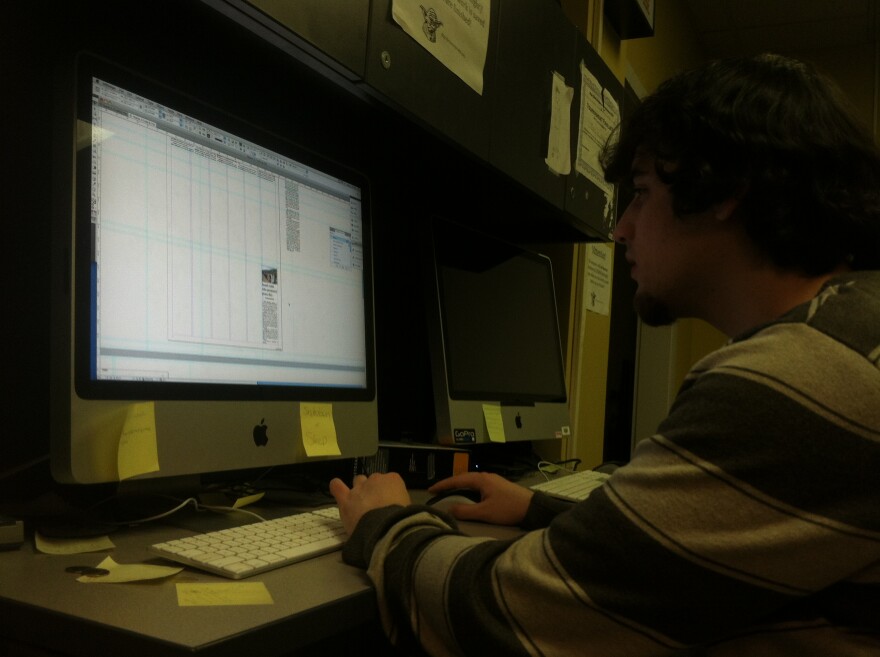Journalism is in a state of transition, as all forms of media continue to adapt to an online model of storytelling.
The Boston Globe made headlines last month, when after 20 years, its owner the New York Times announced the newspaper was for sale.
Three years ago, the Times threatened to shut down the Globe because it was losing money.
But you wouldn’t know any of this talking with Rebecca Marsh.
“I think I want to work for the Boston Globe. I think that would be really cool, covering probably politics or something in arts and entertainment.”
Marsh is a third-year journalism student at Keene State College. She understands the challenges newspapers like the Boston Globe are facing, but she believes they have a future.
“Yes, we are entering a more digital age, but I think that everyone will still like the aspect of picking up the morning paper and flipping through it and looking for the stories they want.”
Ten years ago, I was like Rebecca Marsh, about to embark on a career in journalism. I went back to campus to join two other reporters to speak about the changing face of journalism.
Keene Sentinel reporter Danielle Rivard says the way she shares news has changed. She describes reporting on a county official arrested for driving while intoxicated.
“Before I ever had it up on the website, I had it on Twitter, then we put something up, a little web update online. Then we had a whole different lengthy story in the paper the next day. There’s a three-step process now.”
Randy Booth writes, blogs and tweets for SB Nation, a web-based sports network. He says social media is where news breaks now.
“If you guys don’t have Twitter yet and you want to go into journalism, just get Twitter now and get used to it and get comfortable with it because if you don’t you’re going to get lost by the time you get into a newspaper.”
I had been back to the college several times since graduating, but this…was different. After a decade, I wondered whether students were still passionate about being journalists.
Fortunately, I found the enthusiasm I had for journalism has carried on.
“My name is Michael Woodworth. I am a journalism and communications major at Keene State. And I love journalism for the experiences. I did an internship for the Norwalk Hour in Connecticut over the summer and I did stories that I would never have a chance to experience while I was there. My dream right now is to work for the New York Times.”
Lauren Campbell decided to study journalism after changing majors a number of times. She says effective reporting means embracing social media.
“I interned at WMUR over the summer. They’re on Twitter all the time, on Facebook all the time, they encourage it.”
And while the students said they think the print product has a future, most, like Campbell, acknowledge their primary way of getting news comes online.
“Literally, every morning when I wake up, I roll over and I have my iPod touch and my phone next to me in bed, and that’s the first thing I do, I check my email first, and then Yahoo.com and the New York Times.”
Professor Rose Kundanis says it’s a challenge to stay current in the field. She teaches a course at Keene State College in 21st century journalism models.
“Well, I haven’t started tweeting in my classes yet. I teach a class on writing for the media and we do online writing. But I think it’s got to be coming very soon.”
Kundanis says the purpose of bringing in reporters is to show students that journalism will continue, in whatever form it takes.
“You hear so much about the death of newspapers. But I think if you look at the history, which we’re doing now with radio and newspapers and TV, it’s not that those things died along the way, it’s that they changed, and morphed, and they people that were willing to make those changes, those are the survivors.”
The college has done its part to keep up with changes in the field, adding a digital media course to its core requirements for journalism majors.
And Students also get a lesson in the 24-hour newsroom working for The Equinox, the student-run newspaper. Ryan Glavey is the associate executive editor.
“We had breaking news the other day and we just put that right up to the website. That’s also places where we use our Facebook and Twitter feeds to pitch those stories to breaking.
There is also a more advanced multimedia journalism course, where students learn to produce audio and video for the web.



